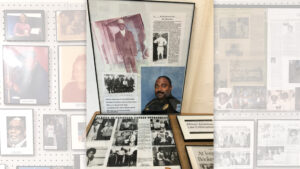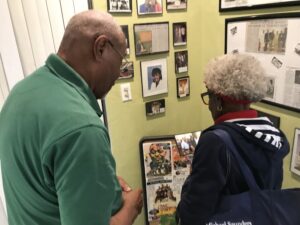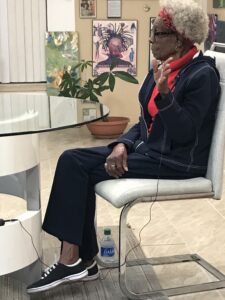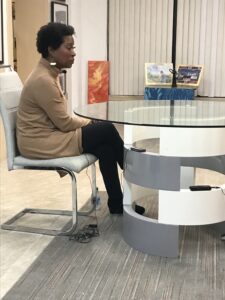In the making: A historical documentary that highlights the achievements of a tightly knit community.
By Johannes Werner
Original Air Date: Nov. 29, 2023
Host: A documentary film is in the making about the history of Newtown, with plans for a public launch early next year. And to make it come alive, the makers have interviewed a dozen people who spent most of their lives in the majority African American community in north Sarasota. Our news team was there to witness the recording of Mrs. Bernice Heggs.

Inside the Greater Newtown Historical Gallery. Right: Jetson Grimes and Bernice Heggs, reminiscing at Jetson’s hair salon. Photos: Ed James, Jr./WSLR

Johannes Werner: Jetson’s Creative Trends on Osprey Avenue near MLK Way is not only the informal town hall of unincorporated Newtown. Owner Jetson Grimes is a kind of central switchboard, a serial local entrepreneur, and he’s the lead organizer of the annual Martin Luther King Day celebrations. He also is the community’s chronicler, historian and archivist. For 30 years, people have brought him their histories, and his business serves as a repository. The walls of the venerable hair salon are covered with photos, memorabilia and drawings and paintings by local artists. And that’s just an extension of the Newtown Museum he maintains next door.
As the resident historian, Jetson Grimes is now leading production of a documentary film on the history he might present during the Martin Luther King Day celebrations Jan. 15. If Jetson gets his way, this will be Part One of a trilogy, to be followed up with a film about the present, and another about the future of Newtown.
Jetson explains.
Jetson Grimes: This community is so unique, because we are one of a few African American enclaves that still exist in the country. … And I witnessed all the black communities, how they gentrified the community, run expressways through the community, and the community took the schools out of the community, killed the business district and everything. But this community sustained itself through all those eras. It was important for me to continue to keep the history, make sure that the history doesn’t just go away, and people don’t know what happened to their community. I saw evidence of that when we talk about Overtown. That was right in our backyard, what they call the Rosemary District now. I don’t think there’s even one African American that owns a property over there now. It’s just all been gentrified. And, you know, the same thing could have happened to this community. And it’s still not late, you know. Those are some of the things that I’ve been trying to do — to make sure this community continues to survive and to prosper and to be successful, and to make sure that the history isn’t forgotten, and to protect the history of the people.
JW: Renée James Gilmore — host and producer of the Empowering Voices show on ABC 7 in Sarasota who also happens to be an offspring of the prominent James family — is a co-producer and interviewer of the historical documentary. She explained Part One of the project to WSLR News.
Renée James Gilmore: It’s a small community, and there’s so much that has happened. One of the things that we want to document through oral history is just how life has been, how life has evolved for residents of this community, and most importantly I think to document through this oral history how we have lived, how we have survived, how we have contributed to this great city.
JW: On a chilly Tuesday evening, it was Bernice Heggs’ turn to be filmed at Jetson’s hair salon. Born in Newtown in 1941, with the help of one of the two midwives in the community, Mrs. Bernice was there to be interviewed by Renée James Gilmore about her memories and stories, while videographer Casey Troop was filming.

… Bernice Heggs. Photos: WSLR

Renée James Gilmore, interviewing …
Former City of Sarasota Mayor Willie Shaw, a regular at Jetson’s, joined Mrs. Bernice and Jetson to warm up and stretch their memories before the recording. They chatted about neighbors, about Mr. Johnson’s mule and sugarmill (yes, he grew sugarcane and cotton in Newtown), and about kids discovering and ingesting moonshine on someone’s property.
All reminiscing: That was a sugar mill? No, he had a sugar mill. He had the mule, and he would stick the cane through there. The Belches were on this side. I know exactly where the Belches were. Yeah, well on the other side of Mr. Johnson. He had a mule and he had a sugar mill cane. Well sugar cane .. in there. Yeah, that’s what he would make, sugar. He’d make the cane; he’d grind the cane and get the juice. Okay, now that was the Belches that he had there? No, Mr. Johnson. Oh, no.
The more structured interview roamed from the silly to the serious and back. Mrs. Bernice talked about her participation in the wade-ins of the 1960s to integrate public beaches, and the lunch counter protest at Woolworth’s on Ringling. She says she doesn’t remember any violent or particularly repressive incidents, guessing that Sarasota wanted to avoid bad headlines because it depended on tourism. She talked about Mr. Rogers, the meticulously dressed disciplinarian who taught Black kids at Booker High that they were inferior. She talked about how she became a member of the Booker Rockettes (good grades were a prerequisite) and of its basketball team. How mango and mulberry “hunting” disappeared when massive mosquito spraying killed many neighborhood fruit trees. And she talked about her job at Sears, but more about her becoming the “Seafood Queen” — how she fished crabs at the bayfront, where later the Van Wezel Performing Arts Center was built, and how she opened a seafood business in Newtown with her son.
A watershed moment was the local push for civil rights in the 1960s. But the history of racial desegregation that followed was far from a happy one. Renée James Gilmore:
RJG: The economics did not keep up with the legal, with the law in terms of desegregation. It’s one thing to say, okay, now … we’re no longer segregated. Desegregation has taken place. So that’s a thing, but that does not change or influence necessarily the behaviors that followed — school desegregation being the perfect example. School desegregation meant that black kids had to get up early in the morning and go to some Sarasota High School or Riverview High School. The white children were not having to get up at some god awful hour in the morning and transport here into Newtown.
JW: The thriving small businesses of Newtown were the ones that suffered most after de-segregation. Renée’s grandmother had run a taxi business and boardinghouse for Black travelers, and Jetson had cut the hair of famous Black sluggers and boxers who came to town but couldn’t get a haircut anywhere else. All that fell away when Black customers were accepted in white-owned businesses, and that left Newtown businesses struggling and closing. Renée James Gilmore explains.
RJG: Right here, where Goodwill is, my great grandmother owned that property when I was growing up. And she had a thriving barbecue stand, a thriving taxi stand. She had rooming houses even.
JW: Even so, Newtown is one of the few Black communities that made it relatively intact through the next era, without being torn apart by highway construction or rapid gentrification. And that leaves a solid base the community could build on to create the next generation of thriving businesses, Grimes says.
JG: I always talk about when we were segregated, our communities had an economy in the community. So how do you bring that energy and that synergy and that economy back to a community like it is now? The beautiful part about it, we are still here. So, we can work and make sure this community can start sustaining itself again. How do we bring that back? And some of the things that I’ve been doing is creating this community as a destination. Sarasota is a city of destinations. If you come to Sarasota, you want to go to the beach, you want to go downtown to finish your experience of cuisine. You want to go to the museum, the art museums. So, we’ve got to create that same kind of destination. This community has got to have a reason to come into the community.
This has been Johannes Werner, reporting for WSLR News.
WSLR News aims to keep the local community informed with our 1/2 hour local news show, quarterly newspaper and social media feeds. The local news broadcast airs on Wednesdays and Fridays at 6pm.